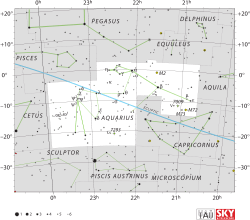3 Aquarii

| |
| Observation data Epoch J2000 Equinox J2000 | |
|---|---|
| Constellation | Andromeda |
| Right ascension | 20h 47m 44.23898s[1] |
| Declination | –05° 01′ 39.7220″[1] |
| Apparent magnitude (V) | 4.429[2] |
| Characteristics | |
| Spectral type | M3 III[3] |
| U−B color index | +1.914[2] |
| B−V color index | +1.651[2] |
| Variable type | Lb[4] |
| Astrometry | |
| Radial velocity (Rv) | –22.0[5] km/s |
| Proper motion (μ) | RA: +1.68[1] mas/yr Dec.: –40.06[1] mas/yr |
| Parallax (π) | 5.57 ± 0.28[1] mas |
| Distance | 590 ± 30 ly (180 ± 9 pc) |
| Details | |
| Radius | 108[6] R☉ |
| Temperature | 3,933[7] K |
| Other designations | |
3 Aquarii (abbreviated 3 Aqr) is a variable star in the equatorial constellation of Aquarius. 3 Aquarii is the Flamsteed designation; it also bears the Bayer designation k Aquarii and the variable star designation EN Aquarii. With a mean apparent visual magnitude of 4.429,[2] it is visible to the naked eye in dark skies. It has an annual parallax shift of 5.57 milliarcseconds with a 5% margin of error,[1] which translates to a physical distance of around 590 light-years (180 parsecs) from Earth.
| Period (days) |
Amplitude (Magnitude) |
|---|---|
| 20.2 | 0.020 |
| 24.9 | 0.038 |
| 27.2 | 0.027 |
| 35.0 | 0.021 |
| 36.9 | 0.024 |
| 143.9 | 0.022 |
| 197.2 | 0.027 |
With a stellar classification of M3 III,[3] this is a red giant star that has exhausted the hydrogen at its core and evolved away from the main sequence of stars like the Sun. The luminosity of this star varies over time, following multiple periods of variability.[9] The measured angular diameter of this star, after correction for limb darkening, is 5.60 ± 0.70 mas.[10] At the estimated distance of 3 Aquarii,[1] this yields a physical size of about 108 times the radius of the Sun.[6] The effective temperature of the outer atmosphere is 3,933 K,[7] giving this star the cool reddish hue of an M-type star.
References
- 1 2 3 4 5 6 7 van Leeuwen, F. (November 2007), "Validation of the new Hipparcos reduction", Astronomy and Astrophysics, 474 (2): 653–664, arXiv:0708.1752
 , Bibcode:2007A&A...474..653V, doi:10.1051/0004-6361:20078357.
, Bibcode:2007A&A...474..653V, doi:10.1051/0004-6361:20078357. - 1 2 3 4 Gutierrez-Moreno, Adelina; et al. (1966). "A System of photometric standards". Publ. Dept. Astron. Univ. Chile. Publicaciones Universidad de Chile, Department de Astronomy. 1: 1–17. Bibcode:1966PDAUC...1....1G.
- 1 2 Morgan, W. W.; et al. (1973). "Spectral Classification". Annual Review of Astronomy and Astrophysics. 11: 29. Bibcode:1973ARA&A..11...29M. doi:10.1146/annurev.aa.11.090173.000333.
- ↑ Samus, N. N.; Durlevich, O. V.; et al. (2009). "VizieR Online Data Catalog: General Catalogue of Variable Stars (Samus+ 2007-2013)". VizieR On-line Data Catalog: B/gcvs. Originally published in: 2009yCat....102025S. 1. Bibcode:2009yCat....102025S.
- ↑ Wielen, R.; et al. (1999), "Sixth Catalogue of Fundamental Stars (FK6). Part I. Basic fundamental stars with direct solutions", Veröff. Astron. Rechen-Inst. Heidelb, Astronomisches Rechen-Institut Heidelberg, 35 (35), Bibcode:1999VeARI..35....1W.
- 1 2 Lang, Kenneth R. (2006), Astrophysical formulae, Astronomy and astrophysics library, 1 (3rd ed.), Birkhäuser, ISBN 3-540-29692-1.. The radius (R*) is given by:
- 1 2 Soubiran, C.; et al. (June 2010), "The PASTEL catalogue of stellar parameters", Astronomy and Astrophysics, 515: A111, arXiv:1004.1069
 , Bibcode:2010A&A...515A.111S, doi:10.1051/0004-6361/201014247.
, Bibcode:2010A&A...515A.111S, doi:10.1051/0004-6361/201014247. - ↑ "EN Aqr -- Pulsating variable Star", SIMBAD Astronomical Object Database, Centre de Données astronomiques de Strasbourg, retrieved 2012-07-16
- 1 2 Tabur, V.; et al. (December 2009), "Long-term photometry and periods for 261 nearby pulsating M giants", Monthly Notices of the Royal Astronomical Society, 400 (4): 1945–1961, arXiv:0908.3228
 , Bibcode:2009MNRAS.400.1945T, doi:10.1111/j.1365-2966.2009.15588.x.
, Bibcode:2009MNRAS.400.1945T, doi:10.1111/j.1365-2966.2009.15588.x. - ↑ Richichi, A.; et al. (February 2005), "CHARM2: An updated Catalog of High Angular Resolution Measurements", Astronomy and Astrophysics, 431 (2): 773–777, Bibcode:2005A&A...431..773R, doi:10.1051/0004-6361:20042039.